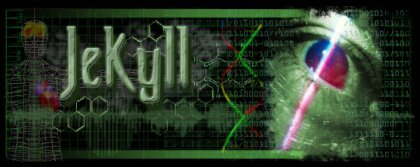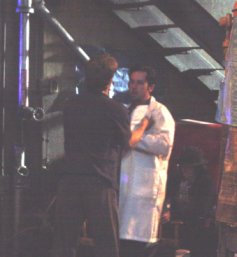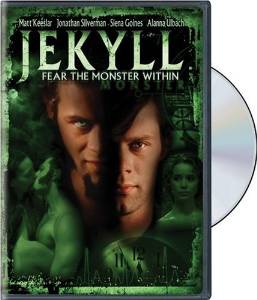
Casting the dual role of Jekyll and Hyde proved to be one of the hardest tasks before director Scott Zakarin. In early drafts of his script, Scott stressed over and over the character’s eyes, not just as a window to the soul but as a window to Hyde. Whoever played Jekyll had to be believably gentle, kind and yet capable of being a monster, at least psychologically. A couple of surprisingly big names flirted with the production, but Scott kept coming back around to one actor who had blown him away in auditions: Matt Keeslar.
The name should be familiar to genre fans, as the actor appeared in SCI FI’s Dune, Stephen King’s Rose Red and played a mysterious boarder in the underrated Psycho Beach Party. But he’s also established himself in the indie cinema scene with appearances in The Last Days of Disco and the upcoming In Memory of My Father.
From the moment he was cast in Jekyll, Keeslar threw himself into the work with an almost manic dedication. Talk to anybody on the set of the film and you’d get the same observation about him, that he is one of the hardest working actors they’ve ever encountered. Luckily, he’s also good.
Scott Zakarin also has one other observation, though. Keeslar has a thing for doffing his clothes. Maybe that was just a Scott thing, but during the course of our interview, Keeslar, in full Hyde make-up, did indeed strip down. I think it was for a costume change.
Though Hyde’s appearance isn’t nearly as monstrous as the ape-like figure of early versions, it’s still …disconcerting. While talking to Keeslar, I found it difficult to make eye contact, as his eyes were covered by inhuman contact lenses. Once he got naked, I had no comfortable place to look except his guitar case.
At any rate, this should drive search engine traffic our way. Matt Keeslar naked. Or if you prefer, naked Matt Keeslar. I promise to let him know if we get a lot of hits as a result.
Derek McCaw: How difficult has it been for you to get into the heads of these two personalities?
Matt Keeslar: The challenge in playing both sides of the character is how far do you stray in either direction? We wanted to make it not be the monster movie of the thirties. We wanted to make it a little more David Lynch, Twin Peaks-type weird, psychological horror. And we use a lot of pseudo-science and pseudo-psychology throughout the script to define the transformation.
The idea being that there is a repressed dark side of Dr. Henry Jekyll that he desperately needs to be liberated. The difficulty ends up being what times does Edward Hyde, the dark character, take on Jekyll’s personality traits? For example, when he’s truly touched or truly emotional or truly losing his temper about something. When he’s not in complete control. And then there are the times when Jekyll, who is normally very staid, very in control, is out of control.
As the movie progresses, the two extremes come closer and closer together, so that you have a semblance of a human being by the end of it.
DM: Talking with a few people here, they’ve raved about your dedication and your preparation – showing up for rehearsals when you didn’t need to be there, being at auditions, all that. Can you talk about the work you did ahead of time to prepare for this?
MK: The thing is that when you’re playing a character that is complicated, any character that’s complicated, it’s hard to not have an influence in every part of the filmmaking process. As an actor, I want to, of course, have great actors surrounding me. You know, people who can help bolster my performance. The better the other actors are, the better my performance ends up being. So I was happy to go in for casting meetings, and help in casting the female leads in the movie. (smiles knowingly)
DM: How many lapdances did you have to go through?
MK: I probably had about fifty lapdances. They were all distinct and wonderful in their own separate ways. And I got lapdances from about every young actress in Hollywood.
DM: Did you get one from Scott?
MK: Scott kept offering to give me a lapdance, but I was like, dude, I’m already working for you. You don’t have to give me anything more. Pay will be enough.
DM: I’ve watched you film a couple of transformation scenes. The way you’re playing it, even though it’s technological, not chemical, still seems very drug-like. It looked almost like snorting cocaine. Do you see this as a story about addiction?
MK: Absolutely. This is an addiction story from a hundred and fifty years ago. It’s about a man who becomes addicted to the dark side of his personality. Frankly, drugs are a big part of what helps people become liberated from their social strictures, and also to come into contact with their dark sides. When you’re doing heavy drugs is when you get into all kinds of the crazy dark side of human nature. Any drug will do, basically.
DM: And there’s a bit of allure to it. You’re having fun, giving Hyde a hint of a British accent. Tell me about the fun.
MK: The addiction actually comes from the fact that Hyde is every man’s fantasy. If you could be a rock star, suddenly, and put on rock star clothing and get all of the pussy that you wanted, and be as crazy and wild and strong, physically strong, confident in everything that you’re doing…that’s what Hyde is.
And so the British accent, or hint of, whatever, mid-Atlantic accent, is part of his dark charm and playfulness. It comes from the fantasy of the doctor, Henry Jekyll, who would like nothing more than to experience that dark side of human nature.
In fact, there’s a scene in the strip club where Jekyll talks to one of the strippers and is completely denied by her. But he goes back as Edward Hyde and ends up getting her into bed.
DM: Right. That would be Christy (Siena Goines). Today on the set you described your character as being two celebrities. I can’t remember who you said.
MK: I’ve told friends that I’ve been going from Michael York to Dave Navarro. But I’ve also with Hyde added in a little bit of a lot of things. A little bit of Charles Manson, a little bit of the dark glam rock star. There are hints of many things.
I read this article on Charles Manson when I was researching the film. I was looking up interviews with serial killers. It was just so fascinating how specific he was. He was very concise with all of his answers. That meticulousness was what I tried to bring to Hyde as well. That sort of precision, that he knows exactly what he’s saying and why he’s saying it. Every rule that he’s breaking is done completely consciously. It’s not that he’s just spazzing out and doing whatever he wants. He’s doing it with the full awareness that he is going against social mores.
DM: In the script, Jekyll is very much in denial of the violence that Hyde is capable of. How is that influencing your performance?
MK: Yes. The reason for the denial of Hyde’s violent nature is the same reason that we all try to deny our negative sides when we’re feeling good. To use the drug analogy, if you took some lines of cocaine and were feeling really great about some things, then later everyone was telling you, whoa, what was up with you at that party? You were such a jerk.
And you’d be saying, no, I felt pretty good, actually. You know?
It’s that same type of feeling. You don’t want to believe that your dark side is unattractive. You want to believe that your dark side is as fun as it seems to be while you’re living it.
DM: This is the second time that you’ve played a major literary genre character, as you were Feyd in SCI FI’s Dune. Do you find that daunting, since people already have their own vision of the character in their mind?
MK: There is a challenge to it, but I try not to worry too much about what people’s opinions of my work are going to be. The reason that I pick characters like Feyd or Jekyll and Hyde is because there’s so much there backing it up. A whole novel of description and experience. So much of that work, the research that you would normally have to do on any project, has sort of been done for you already.
In novels, a lot of times they will give the character’s thoughts and feelings as they’re going through a scene. That puts you in the right mind frame when you’re playing a part.
With Jekyll, there’s a huge speech at the end of the novella, a confession written as sort of a love letter to his friend, his best friend and lawyer, Utterson. In this film, Utterson is actually my old college girlfriend. We fooled around in college and have become best friends. She’s now best man at my wedding. So rather than being my attorney as she was in the novella, this is now a girl who becomes part of the love triangle with Talia, my fiancée, Christy the stripper and myself as both Edward Hyde and Dr. Jekyll.
DM: I see you’ve got a guitar lying around here. Do you just dabble, or are you serious about your music? Are you planning a Keanu Reeves and having your own Dogstar?
MK: (laughs) I don’t have my own Dogstar. But I love music. That’s another reason I like doing parts like this. They are very technical, and they do have a kind of a musical quality to them. You have to use your voice in a different way. You also have to have almost a dancer or acrobatic quality, using your body in a different way. It’s using the full instrument, to take the analogy one step further, rather than just be a talking head.
DM: The speed with which this movie is shooting – do you find that a help or a hindrance to just be barreling through? Scott boasted to me this was four times faster than a normal set would be.
MK: Yeah. I don’t like it. I wish we could have more time to work on scenes, to get them perfect. But I think that what we’ve done is taken the budget and the time that we have and cut down to the bare bones essence of what we can realistically accomplish. In doing that, we’ve made a tighter, stronger script with more action and more conflict. Certainly more than would be in a film being made by a studio where they’d be spending millions of dollars and days and days to rehearse one stunt scene.
Since we’ve been nailing them quickly, getting them out of the way, we’re spending a lot more time on the relationships between characters. Spending more time on actually filming the scenes that are the heart of the story.
Also, I think we’ve been able to do a lot of the transformation through acting, rather than through special effects. In that way, it’s kind of a theatrical performance. And in that way, it’s benefited from the quick shooting schedule. We’ve moved directly from scene to scene, a lot of times going chronologically, which is different from most sets.
DM: Hyde is clearly not so much of a make-up effect. You’re definitely accomplishing it through personality. I also witnessed in the transformation scenes shot today that you’re improvising a lot, with Scott’s direction. So you must feel you know the character pretty well.
MK: Again, if we had months and months for preparation, I could probably have changed Jekyll enough away from myself to make it a much more individual character. The way that I’ve ended up doing it is using a lot of myself for Henry Jekyll. And that’s helpful, because when it comes to improvising, it’s so much easier to improvise in your own voice. You’re actually coming up with your own thoughts.
So we’re taking the limitations that we have as an independent film and a relatively fast shooting schedule, and using it to our advantage. To make it a stronger work.
DM: How much preparation time did you actually have?
MK: I was cast around Christmas time. We started production in mid-January. So I had three or four weeks. Luckily, the internet is available. So all of the research, I could do sitting in my office at home. I didn’t have to go to a library. Anything that I wanted to find on the classic Jekyll and Hyde story, the Jungian idea of shadow vs. light, all the scientific stuff that we did in a lot of the improves, that was all available to me.
DM: Are you ready with a mattkeeslar.com, to prepare for genre fandom?
MK: Sure, sure. When I was a kid, I used to go to The Rocky Horror Picture Show every Saturday. Though I never did the dressing up…
DM: Suuuuuure…
MK: Yeah. And then in summer stock, I was actually cast as the monster. So I’ve always been a fan of fans, and a fan of cult films. A lot of what we’re doing in this has that cult flavor, like The Rocky Horror Picture Show or A Clockwork Orange. It’s taking the classic story of Jekyll and Hyde and making it into the post-modern tale that we are filming. I look forward to it.
So will Jekyll achieve cult status? A lot will depend on Matt Keeslar’s performance, which from what I’ve seen, is absolutely the rock this film needs. And Scott threatens that there is, indeed, at least one scene of Naked Matt Keeslar. Go, Google, go!





